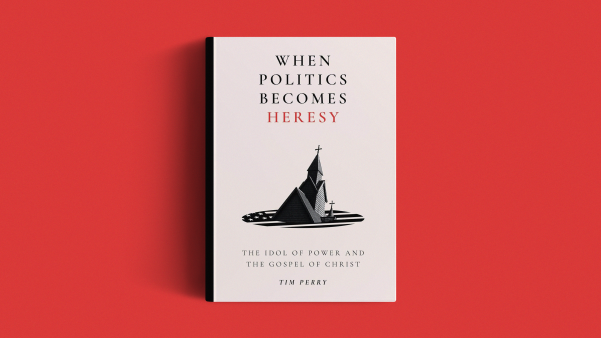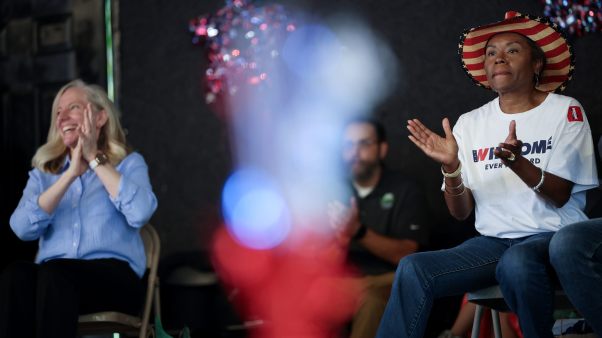Speed Leas may be one of the world's foremost authorities on church conflict, but the first question people usually ask him is not, "What causes churches to fight?" Instead, the starter question is, "Is Speed your real name?"
Yes. Speed's grandfather was named for Joshua Speed, a farmer and acquaintance of Abraham Lincoln. Joshua Speed and Lincoln corresponded regularly, and they argued heatedly in their letters over the divisive issue of their day: slavery. Despite their deep differences, however, their letters display civility and a genuine respect for the other.
Joshua's namesake tries to bring that same spirit into his work as director of consulting for the Alban Institute, a nonprofit research and training group based in Washington, D.C. Each year he consults with dozens of churches experiencing deep conflict and tries to help them clarify the issues, make decisions, and resolve differences.
Speed was thrown into conflict early. After earning M.Div. and S.T.M. degrees from Yale, he became pastor of an all-black church in Watts, and a year later, the Watts Riots broke out. Speed spent time learning community organization from Saul Alinsky, but he soon found that Rules for Radicals didn't work in the local church. "The norms of the church don't allow for that kind of direct confrontation," he says.
Following seven years as director of the Center of Metropolitan Mission In-Service Training (motivating churches on poverty, racism, and other urban issues), the activist became a peacemaker. Extensive study in organizational management, change, and conflict led to the landmark book Church Fights (Westminster, 1973; with Paul Kittlaus). Soon he was a welcome guest in churches as a full-time consultant with the Institute for Advanced Pastoral Studies. In 1977, he joined the Alban Institute.
LEADERSHIP editors Marshall Shelley and Kevin Miller traveled to Speed's home in Northville, Michigan, west of Detroit, to ask him why churches fight and how they can make up.
Do all churches have conflict?
Yes, all churches have conflict; and no, not all churches have conflict. (Laughter) It depends on the way you define it.
A management-school definition might be: disagreement about values, goals, methods, or the facts of a given situation. That approach would say the essence of conflict is people struggling over appropriate values in an organization. Defined that way, not all churches have conflict. In most churches there's a lot of agreement about what our values are, what the purpose of the church is, how we're going to do things.
Most folks, however, don't define conflict that way. To them, conflict really means, "I feel bad," or, to be precise, "Somebody is causing me to feel bad."
Wouldn't they say, "We differ on this issue" rather than "You're making me feel bad," and find some issue to disagree on?
Often that's exactly what happens. In fact, in Western culture, you're not supposed to just feel bad. You're supposed to have a reason. That's why the reasons for some church fights seem ridiculous.
I worked with a congregation where the presenting issue was that the pastor came to work during the week wearing Levis. It seemed like a dress-code issue; tell the pastor not to wear Levis, and things will get better.
Well, that wasn't the issue at all. I met with three groups of members from this church, and all they talked about were the jeans and sloppy desk. Finally, when the fourth group mentioned the same things, I said, "This doesn't check for me. You're the fourth group that's told me this, so I know you're all talking about it. But I can't understand why there's so much energy around these kinds of issues. What else is going on here?"
Gradually the underlying issue came out: people were uncertain that the pastor really respected them, liked them, and cared for them. They felt bad; they identified Levis as a reason to fight.
So the real issue in many conflicts is feelings?
Frequently I'll be called to a congregation that claims to have a big conflict, but when I get there, I find everybody agrees with one another. The problem is that they're in a downtown situation. The people who used to be members have moved to the suburbs, and the church can't attract the people now in the community. They're dying, and it feels bad. They call it conflict because they say, "We don't know what to do. In meetings we spend a lot of time saying, 'Why don't we do this? Why don't we do that?' " And even though it's not a disagreement, it feels like one.
Similar discomfort arises after a long-tenure pastor leaves. The new pastor leads worship a little differently, runs meetings differently, calls on people differently. It doesn't feel right. And so people say, "We've got a conflict about the pastor." But when you really push them, "Do you want the pastor to be different than who he or she already is?" often they say, "I guess we don't. But how do we make it feel better?" They feel unhappy about the change, but they aren't really involved in conflict.
Books and seminars on conflict resolution invariably describe church conflict as normal, even beneficial. But it sure doesn't feel that way to anyone involved. How do you explain the gap between the theory that conflict is healthy and the reality that people quickly get sick of it?
Your question is wonderful, because it reveals the assumption that if something feels bad, it's not good. But are our feelings accurate indicators of reality? That's not my perception at all.
So yes, it feels lousy, and yes, it's good for you?
Exactly. Feelings may be indicators of something we need to change or do something about. But the feelings may be just a normal and natural part of adjustment or growth. I run every day, for example, and it doesn't feel good every day.
What do church people fight about? What are the leading issues?
I studied a large number of cases in which I've been involved. This research is somewhat skewed, because I looked only at situations where the pastor was involuntarily terminated.
About 28 percent of the time, there was significant value conflict, usually in one of four areas:
1. Social action. A congregation would disagree over a community-directed ministry, say a food-and-clothing center for farm workers.
2. Liturgy and how worship should be conducted. They'll fight over whether or not to pass the peace. (Laughter)
3. Theology, usually charismatic versus noncharismatic or conservative versus liberal.
4. The lifestyle of the pastor-not a moral problem of the pastor, but disagreement within the congregation about what's appropriate conduct for a pastor. It often centered on social drinking, dress, community groups to belong to, activities the pastor's spouse was involved in.
So values questions were the biggest source of conflict?
No, I wish I could say they were. It would be great if people fought about significant things. (Laughter)
The biggest single category-46 percent of the total cases-involved the pastor's interpersonal competence. And this 46 percent divided equally into two situations. In one (23 percent of the total), the clergy were withdrawn, apathetic, not taking initiative, not providing any kind of leadership. And the other 23 percent involved pastors who were contentious and authoritarian.
What about commonly expected skills, like preaching? Do churches often squabble about "We're not being fed?"
Rarely were traditional skills the fighting issues. Only 6 percent of the time was bad preaching one of the major causes for the involuntary termination.
Another 12 percent of the time, though, the issue was pastors' not doing their job, just plain not working. In one case, a pastor in the Southeast owned a gift shop in a local hotel, and he spent most of his time there. He would show up at worship services and read his sermons out of a published collection of sermons. In another case, a church board asked the pastor to establish a Bible study group, to organize a church directory, and other things, and the pastor just ignored their requests.
Finally, 9 percent of the time the pastor was physically or mentally ill, which I assumed because they were hospitalized within six months of the termination. Most of these were alcoholics who entered treatment programs.
The pastor certainly seems to be the focal point. But would that hold true in church fights where the pastor is not terminated?
My guess is that the numbers wouldn't be far different. Often the pastor's leadership becomes the central issue no matter what people are really fighting over. The pastor will be blamed for taking one side, for not taking a side, or for the fact that others are having conflict.
I worked with a church in the Midwest where everybody agreed that the pastor was competent and held the same values as people in the congregation. But the conflict didn't stop, and the people didn't know what else to do, so they fired the pastor.
It was completely unfair and wrong, because the conflict had to do with the Christian education department. The director of the department, a woman from one of the church's big families, wanted to do things differently than her committee did. The pastor didn't take a side on the issue, and he tried to be helpful, but he couldn't stop the fighting, so the church fired him. They couldn't fire the woman.
My guess is that in only 20 to 25 percent of church conflicts is the pastor not significantly threatened or in the middle of the conflict in some way.
What should pastors take away from the fact that 75 or 80 percent of all church conflicts involve them directly?
That it's normal. That if this year we're having a conflict in which I'm seen as one of the critical elements, it's not unusual.
Pastors will want to develop skills to deal well with conflict. But even more important than professional skills and resources is the pastor's faith life. The way you deal with conflict is a function of your theology. It's important to accept Christ's message about conflict: we don't have to be afraid; we can stand for what we believe; that standing, that struggle, is redemptive. Conflict becomes destructive and horrible when it's meaningless, when there is no reason to stand, when no one is being helped to grow and change and be different.
With that kind of faith perspective, we can ask, not "Do we avoid the conflict?" but rather "Is this an opportunity for redemptive action?" Ministry happens in a profound way in the midst of struggles.
What's the most important thing pastors should do when they smell conflict brewing?
Get good data. If people on the board are talking about others on the outside, you need some way to get data from those who are on the outside. You can't rely just on hearsay.
As an illustration, let's roleplay an incident that happened to a pastor we know, who was hit with a surprise attack. We're board members; you're the pastor.
Go ahead.
We're in a board meeting. "Pastor, I think the board should be aware of the fact that there are a number of people who are very upset about your counseling. They say that you don't help them and that, in fact, you counsel over your head."
As a pastor, I might say, "You know, I'm not aware of any dissatisfaction with my counseling. I'm surprised; in fact, my throat is clutching when you mention it. I thought I was doing a good job. I'd really like to know where I'm having problems and how I can improve on that. I know this is a sensitive issue, because the people I've counseled might not want their situations brought up. But how can I get information about what I've not done right so I can get the help I need? Would you all mind taking 15 or 20 minutes tonight to talk about how I can get accurate information that will help me improve? Counseling is one of the most important parts of my ministry."
Board member: "I don't think it would be fair for me to disclose people's names. I mean, that's their business. It's not ours as a church council."
"I agree with you . . ."
"But what does concern me is your performance, not giving people the help they need."
"Boy, it really concerns me too. I thought I was helping them. And you know, if I'm messing up, I want to improve. But I need to know what it is that I've done poorly. Now, I agree with you that those people may not want to talk to me. That may be embarrassing. Could we spend some time talking about how I might find that out?
"Let me try something: What if those people typed a letter, anonymously, to you or to me that I can read? Then I would agree to take that to a counseling professor at the seminary and ask him what kind of help I should get to do better at this. That's so important to my ministry, I just don't want to mess up."
We could feel the thermostat lowering as you talked. Walk us through what you were doing.
One, I'm affirming you for raising the concern. I want to say, in effect, "It is appropriate to raise questions about any aspect of my ministry. I want to hear it. I want you to know I want to hear it."
Two, I want to take seriously your perceptions. So I'm going to try to understand what you're really saying.
Three, I want to figure out a way to solve the problem, which means, first, I need to get the data. I'm not going to back off that. If the board member doesn't like my proposal about the anonymous letter, then we'll try something else. And if that antagonist won't give me good data, most boards will support me if I honestly ask for help, and he or she isn't willing to take an extra step to respond.
So regardless of how the conflict starts, you want to get good information. The next step?
As I get the data, I must do good analysis: "What are the objectives of the people in the midst of the conflict? What kind of language are they using? What kind of help do we need to deal with it?" (See "How Bad is the Conflict?")
Clouding the process, of course, are unwritten rules: "We're not supposed to have conflict. We're not supposed to tell the person with whom we have the difference what our difference is; we're supposed to agree with them publicly. We're always supposed to agree with the pastor." The rule about always agreeing with the pastor sounds good, but it sets up a conspiracy to tell half-truths to one another. People say, "We're getting along fine," when, in fact, they're sabotaging what's going on.
The other thing I want to do is to draw on my faith resources. In my daily prayer and meditation, I attend to what's happening to me spiritually as I go through this struggle. I may want to spend extra time with my faith mentors, getting their perspective. I wrote a paper once called "Being Pushed into Your Religious Dimensions," and I think conflict causes that. It makes you ask religious questions so I want to be aware of how I'm answering them.
What are some appropriate and inappropriate ways to answer the religious questions raised by conflict?
Inappropriate: "Those people are nothing but evil, and my job is to get rid of that evil." "I'm going to be ruined, my family will be ruined, I will not be able to survive economically, and our kids will be socially ruined in the community."
What are appropriate ways, theologically, to be responding? This is one of those cases where you read in the New Testament "Be not afraid," and you say, "Oh, yeah?" (Laughter)
But that's the issue: how can I not be afraid in this situation? How can I live with the distress? How can I affirm the right of that person to question? How is God speaking to me through this person?
What messages might God speak through an antagonist?
Take our illustration of the person with complaints about the counseling skills of the pastor. Maybe I need to hear something so I can improve. Or, perhaps that board member is crying for help. There may be an opportunity to minister to him, and he's testing to see if I care for him even when he is nasty.
My experience with God is that it's often through the painful times that new life takes place. I don't like it that way; I would much prefer a Disney movie. But there's something about a refiner's fire.
After you've gathered the data and analyzed it, what would you say publicly about the conflict? Would you say anything from the pulpit?
I wouldn't give the data on the conflict or analyze it from the pulpit. The pulpit is usually an inappropriate place to do that. Sunday morning is a time for us to celebrate God's mercy and to seek renewal.
But I would definitely communicate about it. Maybe send out a letter, maybe continue to do things as always. For example, if the minutes of the board meetings are always posted on the bulletin board, that may be best. You might say, "We're working through the issue of the pastor's counseling, and these are the steps being taken."
So first you communicate that there is discussion in progress?
No, the first thing to communicate is that nothing scares us to death. We can deal with it. The second thing is that there's a discussion in progress.
Do you need to talk about a time line: "We anticipate having a decision made by this date . . ."?
Yes, you should take all the normal steps in problem solving. In fact, the higher the level of conflict, the slower and more careful you ought to be in indicating "These are the steps; this is when input is asked for; this is who has authority to make the decision."
Ordinarily, though, Sunday morning is not a good time to do conflict management. Why? Because often the fight doesn't fit within the formal organization of the church. It isn't just in the Session or just in the Christian education department. Instead, the conflict may involve a small, informal cluster of people who have a bug in their ear about something. So what I want to do is let those who are concerned about the issue communicate with those who have authority to deal with it. I want to create an environment where they can talk with each other about the issues. If I talk to the whole church on Sunday morning, it's really this little group over here that I'm concerned about. The others get splattered, even though they don't really need to deal with it. Furthermore, I usually have to speak in such vague terms that the concerned group finds it easy to misunderstand it, and the rest wonder what's going on.
It's more productive to create a forum for the conversation that includes the people affected by the decision and the people making it.
So you wouldn't recommend special congregational meetings to deal with the problem?
Sometimes they're necessary to make a decision, but Lord have mercy if we're just getting together to talk about the problem. Congregational meetings are usually unsafe places for people to talk; they tend to distort people's views and cause people to polarize. It's usually better to start with small groups, listening to their concerns. But if small groups aren't possible, talking about the conflict in a church meeting is better than taking it underground: "We'll talk about this secretly; we can't talk about it openly."
How do you evaluate the outcome of a process like this? After a church fight, is it possible to use words like success and failure?
Every time I negotiate with a church vestry or council, somebody asks, "How often are you successful?" I say, "Whose side are you on?" (Laughter)
People usually want to define success by the issues: the pastor left, or the pastor stayed, or their theology was vindicated.
But regardless of the particular issues, I have clear, specific criteria for judging whether I've been a success, and I test them both at the end of the contract and a year or two later.
The first is, Were we able to identify the issues on which we needed to make decisions? I define conflict management as the art of decision making. Conflict comes when people are undecided. They haven't figured out their goals, or program, or structure, or kind of worship service, or whatever. So the first question is, "Did we agree on what decision had to be made?"
The second question must be, "Did we make that decision?"
Right. If they're still fighting when I leave, the consultation has been a failure.
The next question is, Did I reduce tension? As much as I talk about bad feelings being appropriate in a given situation, we don't want them to go on forever. If they do, we've got a troubled organization. I want to reduce tension and increase the sense of safety in the congregation.
The next question I ask myself is, Did I help people develop skills to manage conflict in the future? I have failed if they have to call a consultant a year later.
What if people leave the church? Does that help you determine success or failure?
It depends. A final question I have is, Did every group with a legitimate right to be heard receive a hearing? I have failed if I help one group take over or drive out another group.
It's not unusual for a pastor or a board to say, "We've got a problem with a minority group in our congregation. How do we get rid of them?" I can't accept that job, because it doesn't help us learn how to deal with differences.
But isn't there often disagreement about whether a group has a right to be heard?
Oh, yes. There are times when I agree with the majority that folks don't have a right to be heard. For example, I worked with a northeastern church where a significant number of people left the congregation and became pledging and voting members of another church. Now they were coming back to the church I was working with and trying to influence policy. So I set a ground rule: only those people who would move their membership from the other church and commit themselves to the future of this congregation could join the process.
What confused me was why nobody in the congregation was willing to say that. They seemed to think you ought to let anybody have a say, hoping, I suppose, that people would come back.
On the other side of the question, I worked with a large, southern congregation that had a basically conservative, noncharismatic membership. But it also had a large group of charismatic Christians who had a prayer and praise service midweek. The Old Guard was trying to keep these folks off boards and committees, and setting up votes that wouldn't allow those people to participate. I said, "Wait a minute. The conflict is between these two groups, so both groups have to be in the conflict."
Let us play devil's advocate. For an institution to have a healthy identity, isn't it essential to say, "This is who we are, and this is who we are not"?
Sure, that's making a decision. Some churches appropriately clarify their identity when they say, "If you're going to teach our children yoga in the Sunday school, you can't be a teacher here. This is not a Hindu congregation." Every church does that to some degree, setting boundaries for what fits and what doesn't.
But the key is that all the people have had an opportunity to influence that decision. I think a group's identity becomes stronger when it addresses differences and when it is challenged. The identity becomes weaker when leaders say, "We won't allow anybody to challenge us. We won't look at anything that's different." Discussion doesn't mean a minority viewpoint will win. It does mean we're going to help each viewpoint be expressed appropriately.
So as you look at your consultations last year, how many would meet your criteria for success?
A little more than 50 percent. Conflict management is in its early stages of development, and the issues we're dealing with are so big, so power laden, there's no guarantee of success. Most congregations that get into serious conflict-and especially those that are willing to bring in an outside consultant-are in it so bad that the odds are only a little better than 50 percent that it will get better. And only 20 percent of the time will people say, "Everything is fixed. We're in a new, hallelujah state."
So part of my job is to help people set realistic goals about what it means to manage conflict in a given situation. But I'm optimistic; if I thought there was no hope for resolution in a church conflict, I'd go into radio repair. I assume you can fix those. (Laughter)
Why are you in this ministry of conflict management? It has to give you a lot of heartburn. What keeps you going?
I want to help the church be a healthy institution, and I think this is one way I can do that. As a healthy model of how to live in community, the church will be able to help society-in fact, the whole world.
At another level, I've always struggled with conflict in my life. Conflict has been hard for me. I haven't understood it, and I haven't understood myself in the middle of it. So my work is partly a quest to understand what happens in me when I get in a conflict, so I can do better.
What do you like about the way you see pastors handling conflict?
Most pastors I see are dealing with conflict every day and doing it well. They've gotten a lot of good training in seminary about how to do active listening, how to respect people, how to genuinely care for them. They know they're in ministry to others and so do not act from a stance of "I'm out to win. I'm gonna fix you, you dummy!" I respect the way most clergy handle themselves in conflict situations.
I feel a little like a psychiatrist who sees a lot of people who are disturbed and anxious and frightened, but who knows everybody's not that way. Generally I see health in the church. I see churches growing. I see people being changed by the ministry of their churches. I am enthusiastic about clergy and congregations.
Copyright © 1989 by the author or Christianity Today/Leadership Journal. Click here for reprint information on Leadership Journal.









